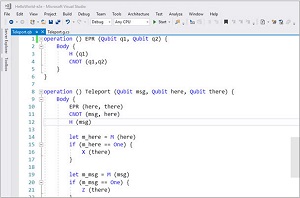News
Coming to Visual Studio: Quantum Computing
One of the notable announcements at Microsoft's Ignite conference was the news that the company is making a big play in quantum computing, and those efforts will be tied into the Visual Studio IDE.
The company used the Orlando conference to report its progress made in the mysterious, esoteric field of quantum computing, and Allison Linn subsequently penned a blog post to provide more details.
"That progress includes a new programming language, which is deeply integrated with Visual Studio and designed to work on both a quantum simulator and a quantum computer," Linn said.
It will be a long while before you're wrestling with a memory-grabbing quantum simulator in your favorite IDE, though, as Linn noted that so far, the company's progress has been focused on "developing both a topological qubit and the ecosystem of hardware and software that will eventually allow a wide range of developers to take advantage of quantum computing's power."
Quantum computing is the sharpest of cutting-edge technology efforts today, and even understanding it is a chore. Wikipedia says in part: "Quantum computers are different from binary digital electronic computers based on transistors. Whereas common digital computing requires that the data be encoded into binary digits (bits), each of which is always in one of two definite states (0 or 1), quantum computation uses quantum bits, which can be in superpositions of states."
Microsoft's attempt at capsulizing the concept on its "Empowering the Quantum Revolution" site focuses more on what it does (or hopefully will do) rather than what it is: "Quantum computing takes a giant leap forward from today's technology -- one that will forever alter our economic, industrial, academic, and societal landscape. In just hours or days, a quantum computer can solve complex problems that would otherwise take billions of years for classical computing to solve. This has massive implications for research in healthcare, energy, environmental systems, smart materials, and more. The quantum economy is coming. And Microsoft envisions a future where customers use Azure for both classical and quantum computing."
Microsoft last November announced that longtime Microsoft executive Todd Holmdahl would lead the company's scientific and engineering effort to develop of scalable quantum hardware and software. At Ignite, CEO Satya Nadella and others reported on those efforts.
"At Microsoft we are taking a 'full stack approach', including programming and controlling the quantum computer at scale," Nadella said in a blog post complementing his keynote address in which he described the company' quantum computing efforts.
 [Click on image for larger view.] Visual Studio Quantum Computing Code, Showing ".qb" File Extension (source: Microsoft).
[Click on image for larger view.] Visual Studio Quantum Computing Code, Showing ".qb" File Extension (source: Microsoft).
"And we want to empower developers and engineers around the world to develop these types of solutions," Nadella continued. "What's more, Microsoft has created an entirely new domain specific programming language optimized precisely for exploiting scalable quantum computers, a language that's deeply integrated into Visual Studio.
"Through quantum computing, we can unlock solutions to problems in areas such as artificial intelligence, clean energy, global warming, materials design and much more. At Microsoft, we're on the cusp of empowering a quantum revolution with our unique, topological approach."
Nadella described the "topological approach" as "a unique approach where the quantum building block is naturally protected against errors, using topology to hold the information."
The Microsoft CEO said quantum computing will enable developers to help find solutions to today's problems such as artificial intelligence, clean energy, global warming, materials design and much more.
With details skimpy so far, developers are likely to be curious about when the quantum/Visual Studio integration will take place, what the new programming language will be called and how it will work and so on.
A Microsoft Quantum blog post published today provided little more information. "As our CEO mentioned yesterday, Microsoft's quantum computing programming language, which is deeply integrated with Visual Studio, and simulators will be available later this year."
Stay tuned for specifics when they become available.
About the Author
David Ramel is an editor and writer at Converge 360.